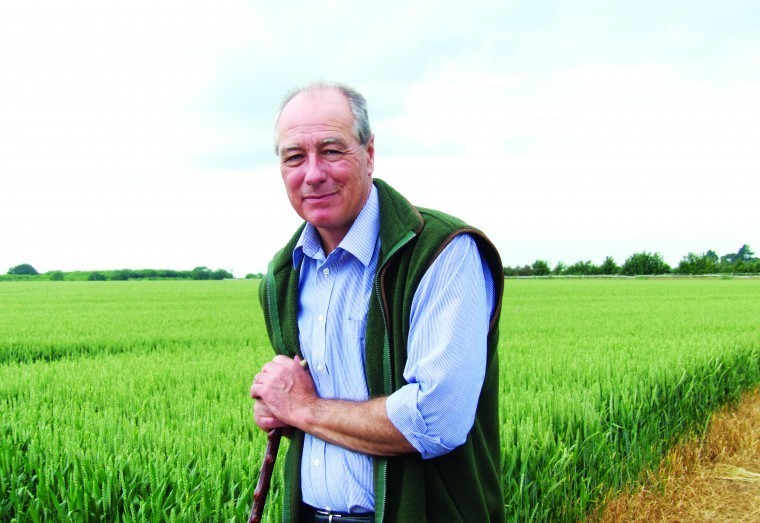Well, harvest is not finished although we are certainly a long way through it and we do have a clear view of how it is going for us in north Kent. Oilseed rape finished up with an average 3.5 tonnes a hectare across all sorts of soils and varieties. It is best summarised as average. There was too much disease evident in the canopies as the pods filled to expect anything better.
On the wheat, we only have 800 acres left to cut and yields have been good. Most has been very dry off the combine in the region of 11 to 12%. The unsettled spell has caused us to look to the grain dryer and we face a point when the heat of early August has disappeared to be replaced by more typical August temperatures and the finishing straight may stretch out.
Yields have largely followed soil quality and have been above 10t/ha on good ground with some Siskin as a first wheat reaching 11.5t/ha which, considering it is a variety that shows stress in dry conditions, is exceptional in a dry year. The strong winds at the end of July did find out the better yielding wheats and most of the Siskin and Zulu was lodged over albeit not flat as last year, but certainly challenging enough to slow up combining. We did target those lodged farms in the high temperatures and have finished all the badly lodged crops now unless the weather provides a repeat. But most of what we have left to cut is stronger standing such as Basset and Relay.
We have cut the first 260 acres of the spring barley, Planet and it has averaged 7.4t/ha. Again this is a very good yield with a moisture of 14.5% off the combine although the remaining 50 acres was later drilled and the rain storms may well be battering away the quality. It is a conundrum in growing a spring crop to help control black grass that we need a thick stand for competition which we then need to growth regulate to an extreme to keep it standing. It is then very short at harvest but at least it is standing and there is no evident black grass so that has to be defined as a success whatever the yield.
I believe most of the good yields stem from the deluge on 29 May when we received 75 to 90 millimetres of rain across most of our farms followed by the sunshine and high temperatures which has produced the yield. Clearly anywhere that missed that rain – and a lot of the west and north did – has suffered with poor yields and the current strong prices may well not fully compensate.
The one thing that has not gone to plan is straw baling and there are fields of rowed straw across Kent – including many of ours – where contractors have not carried through and baled the straw they have asked for. Now we are looking at a more changeable forecast that represents a lot of hard work in turning the situation round. The situation is made worse by the large straw rows behind combines with 12 metre headers that are going to take an awful lot of turning and drying before they can be baled.
Despite the demand I expect to chop most of what is left standing simply so we can get on with cultivations before drilling oilseed rape. No doubt it will all get baled and cleared eventually but right now it is not encouraging. We rowed a lot of straw as we were worried about incorporating it and getting a seed bed with hard ground conditions. But now we seem to be over the worst of that as the rains have appeared. There is also a bonus in that the catch crops that we drilled in July have now emerged and are growing well with no need to worry DEFRA and the Rural Payments Agency about derogations as I feared last month.
It does not seem to be just the UK and Europe that has suffered weather problems with crops and the wider effects are feeding through into grain markets. In the year running up to Brexit, this must be a good thing for politicians to think about. I suppose President Trump’s attitude to trade and how he treats his friends should also be a matter for our government to ponder as Trump’s America first policy is what it says on the tin.
I realise it is the summer and political stories are thin on the ground but finally it seems to be dawning on the press and politicians that our exit date is looming and there is precious little progress on a frictionless trade deal with Europe. The result is an increasing analysis of what a cliff edge no deal reversion to World Trade Organisation rules might actually mean for the UK and it is worrying from where I stand not just in terms of agriculture but our whole economy.
It takes a very right wing political view to regard that with enthusiasm and while there are a number in the Conservative party of that view I hope that their dogma does not prevail. I must admit to wondering whether the current mess was contemplated by the majority in the UK who voted for Brexit as the details at the time of the referendum were sketchy at best – mainly because no one knew what the scenario of leaving would look like as no country had left the European Union before.
Still we are where we are and the Chequers deal probably represented the best compromise for a future trading relationship with Europe while not satisfying the Brexiteers nor the Remainers. It is one great fudge and while it probably is the best outcome we can look forward to, whether the 27 countries of the EU agree is another matter entirely.




